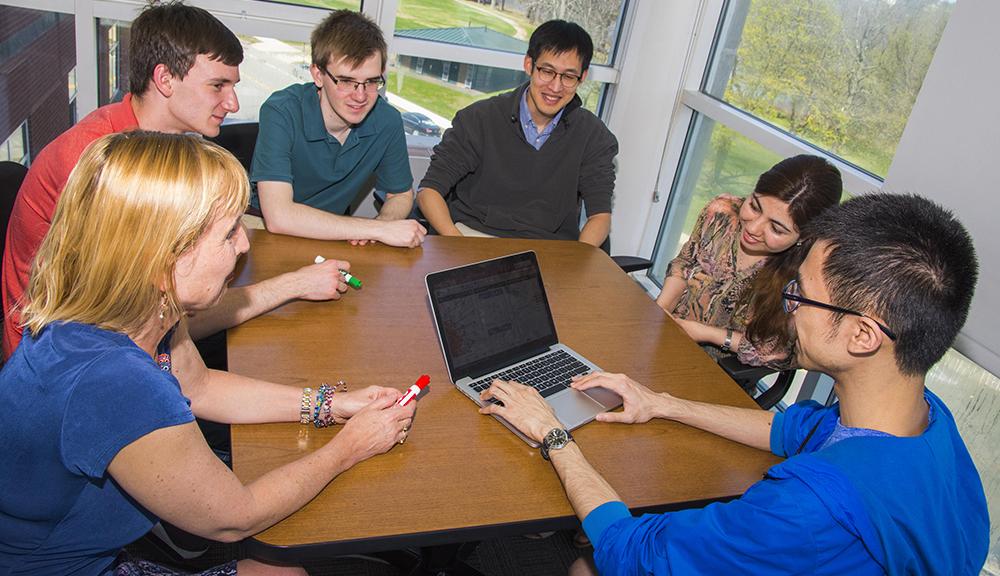One of the first programs of its kind, in the nation, WPI’s interdisciplinary PhD in Data Science recognizes that traditional data processing applications can no longer handle today’s large and complex datasets. New models are needed to handle big data; and knowledgeable graduates with expertise in turning those observations into meaningful recommendations are in high demand.
You’ll be working alongside faculty and industry partners to analyze, capture, search, share, store, transfer, query, and visualize huge amounts of data to solve real-world challenges. Some broad-stroke examples:
- using predictive analytics to identify cyber threats
- employing big data analytics to improve healthcare outcomes
- empowering “smart” cities to make data-driven policy changes critical for societal well-being
Applying to the Data Science PhD Program
Students applying to the data science PhD program will find WPI’s data science degree options listed with engineering, science, and mathematics on the application form.

WPI’s PhD in data science is interdisciplinary, drawing from Computer Science, Mathematical Sciences, and the Business School. Together, courses and dissertation research revolve around five key areas:
- Integrative Data Science
- Business Intelligence and Case Studies
- Data Access and Management
- Data Analytics and Mining
- Mathematical Analytics
Plan of Study
PhD requirements include coursework as well as a research component. Together they total a minimum of 60 credit hours beyond the Data Science master’s degree requirement. Students entering the Ph.D. Program with a bachelor’s degree first complete the M.S. in data science at WPI using the M.S. Thesis option as first step towards their Ph.D. degree.
Each Ph.D. student is assigned an Academic Advisor and together they formulate a Plan of Study that then is approved by the Data Science Steering Committee.
- Core coursework requirements in the 5 categories as detailed below – 21 credits / 7 courses
- Electives in coursework – 9 credits / 3 courses
- Research credits – 30 credits
TOTAL 60 credits (beyond MS program)
Core Data Science Coursework Requirement (21 Credits / 7 Courses)
A Ph.D. student must obtain core competency by taking 7 courses from the below list of Data Science core areas, with an A grade in 4 out of the 7 courses and at least a grade B for the remaining 3 courses, within 2 years after starting the Ph.D. 60 program.
Integrative Data Science (Required)
DS 501. Introduction to Data Science (3 credits)
Mathematical Analytics 3 credits (Select at least one)
DS 502. Statistical Methods for Data Science (3 credits)
MA 542. Regression Analysis
MA 554. Applied Multivariate Analysis
Data Access and Management 3 credits (Select at least one)
CS 542. Database Management Systems (3 credits)
MIS571. Database Applications Development
DS 503. Big Data Management (3 credits)
CS 561. Advanced Topics in Database Systems
Data Analytics and Mining 3 credits (Select at least one)
CS 548. Knowledge Discovery and Data Mining (3 credits)
DS 504. Big Data Analytics (3 credits)
CS 539. Machine Learning
Business Intelligence and Case Studies 3 credits (Select at least one)
MIS 584. Business Intelligence
MKT 568. Data Mining Business Applications
Electives
Nine more course credits must be taken, with the listing of courses pre-approved as electives for the Data Science program found in the WPI Graduate Catalog under Data Science. Other graduate courses, graduate research credits, or ISGs may also be used, with prior approval of the Data Science Steering Committee.
Two elective courses designed as ramp up courses for students who may be lacking in sufficient background in either statistics or programming, respectively, are listed below. They can count towards the 33 credits of the DS MS degree, However, they cannot be used to meet the above requirements in five core categories.
MA 511. Applied Statistics for Engineers and Scientists
CS 5007. Intro to Applications of CS with Data Structures and Algorithms (Programming for non-CS majors)
Research Credits (30 Credits)
At least 30 credits must be research credits, consisting of DS 597 Directed Research and DS 699 Dissertation Research. Prior to Admission to Candidacy, a student may receive up to 18 credits of Pre-Dissertation Research under DS 597. Only after Admission to Candidacy by passing the Research Qualifier may a student receive credit toward Dissertation Research under DS 699.
As part of the research component, PhD students pass a Qualifying Examination and propose and defend Dissertation Research. Learn more about the Ph.D. milestones, including the Ph.D. Qualifying Examination, the Ph.D. dissertation proposal and Ph.D. final dissertation defense.
Software Tools & Labs
The Data Science Innovation Lab is dedicated workspace for project work by students in the Data Science program. Robust servers and computer clusters are available for experimenting with large-scale datasets throughout labs at WPI, including many interdisciplinary facilities.
State-of-the-art software programs:

Close faculty interaction, cutting-edge equipment, and personal attention let you structure your program so it suits your individual career goals. You’ll leave with a degree that will help you succeed in your distinctive path.

Data science research gives you opportunities to work on grand challenge problems with societal importance, including topics such as cybersecurity, healthcare, and sustainability.

Our data science graduate program offers expertise in computer science, statistics, and business topics while giving you essential opportunities to work with industry partners.

WPI’s innovative and multidisciplinary graduate program prepares students to become talented and effective leaders in this rapidly evolving field.
WPI faculty and candidates in the PhD in data science are exploring every aspect of this burgeoning field. Together, they’re fueling breakthroughs that have direct, real-world impact in health, genetic analysis, sustainability, educational software, financial trading, and more.
A faculty advisor will help you design a Plan of Study for your dissertation as well as coursework in the core areas of data analytics and big data computing, statistical foundations and mathematical analytics, and business intelligence and innovation.
Cassandra
DB2
Hadoop
IBM Cognos
IBM ILOG CPLEX
IBM SPSS Modeler
InfoSphere Big Insights
InfoSphere Streams
Mahout
Maple
MATLAB
MySQL
Oracle Server
Palisade DecisionTools Suite
R
RapidMiner
SAS
Spotfire
SQL Server
Tableaux
Weka
Faculty Profiles





Have questions?
WPI's dedicated graduate student support team can help.
The Data Science Community

Getting Involved
Refer a Friend
Do you have a friend, colleague, or family member who might be interested in a WPI graduate program? Click below to tell them about our programs.
Need to Earn a Master’s First? Explore Our Pioneering MS in Data Science
Not quite ready to apply for our data science PhD program since you first need to earn a master’s? Our pioneering master’s in data science dives into how to articulate findings into how to synthesize huge amounts of data and articulate findings into innovative solutions. WPI is one of a handful of universities that offers a MS in data science. Are you a working professional and prefer to study online? Our master’s in data science online makes it possible for you to advance your expertise from wherever you are conveniently online. Our core courses dive into the same on campus data-science essentials like analysis techniques, database management, and more. Maybe you’re excited about elevating your career in big data, but have questions about PhD data science salary and popular job titles. Check out our career information for data science.
Advance Your Data Science Skills with a Graduate Certificate
Individuals who know how to interpret and harness large amounts of data are in high demand and our graduate certificates are a perfect way to customize your data science skills and aspirations. Our on campus graduate certificate in data science enables students to select six courses that dive into mathematical analytics, data management, business intelligence, and more. Maybe you have a busy work-life balance and prefer to study online? Our online data science certificate brings world-class instruction right to you with flexible course offerings that enable you to enhance your data analytics skills.
Ready to Start Your Data Science Path?
If data intrigues you and you love the idea of finding patterns and revealing the information in massive amounts of data, a future in data science likely appeals to you. If you have your sights set on a PhD in data science, you can get started on the right academic path with a bachelor’s in data science. WPI’s bachelor’s program offers hands-on projects to increase your understanding of the field while giving you real skills you can use. If you’re majoring in another field, such as business or computer science, a minor in data science will give you a solid understanding of data science concepts. With a minor in data science, you’ll gain skills and learn how to apply them to your chosen discipline.
WPI is proud to be the recipient of not one, but two National Science Foundation Research Traineeship programs. The programs provide exceptionally talented graduate students with specialized training and funding assistance to join careers at the forefront of technology and innovation. The programs are for graduate students in research-based master's and doctoral degree programs in STEM.
The BioPoint Program for Graduate Students has been designed to complement traditional training in bioscience, digital and engineering fields. Students accepted into one of the home BioPoint programs will have the flexibility to select research advisors and take electives in other departments to broaden their skills. BioPoint curriculum is designed to be individual, interactive, project-focused and diverse, and includes innovative courses, seminars, journal clubs and industrial-based projects. Learn more.